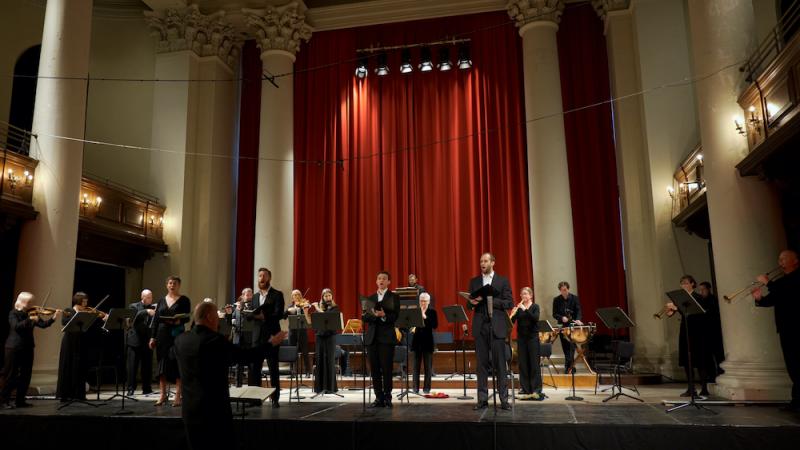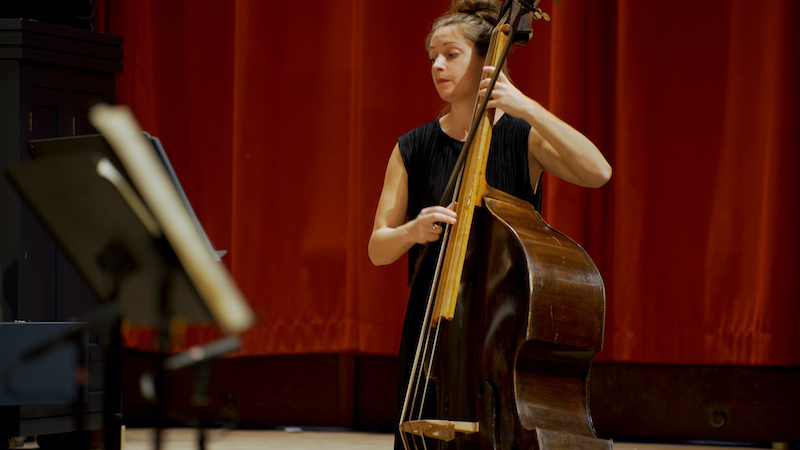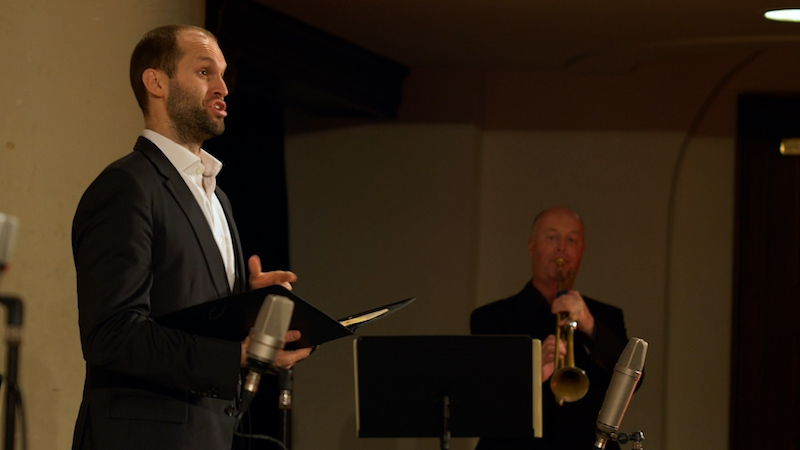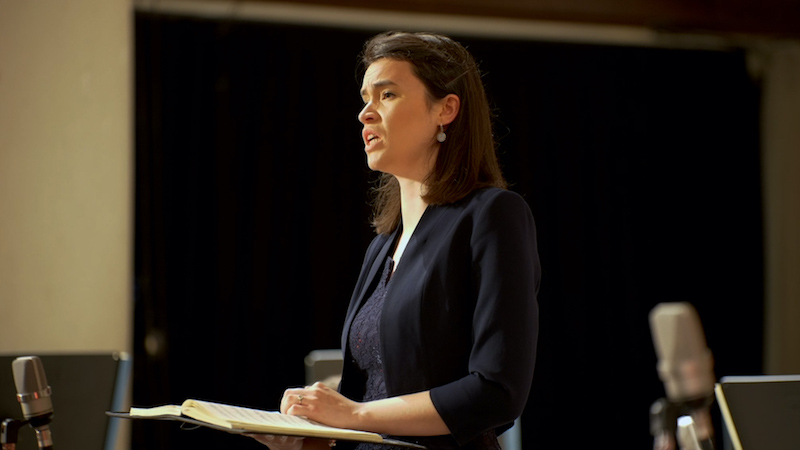Gabrieli Consort, McCreesh online review - joyous Bach Christmas Oratorio | reviews, news & interviews
Gabrieli Consort, McCreesh online review - joyous Bach Christmas Oratorio
Gabrieli Consort, McCreesh online review - joyous Bach Christmas Oratorio
Pared-down reading makes for an immersive experience

After the main portion of the Voces8 Live from London Christmas festival revelled in the variety of its groups and repertoire, the final stretch allowed a single group to explore a single masterpiece by a great composer.
McCreesh adheres to the theory that Bach’s so-called choral works would actually, in his day, have been performed, not by a choir, but by four singers singing all the music, one to a part. This notion, dating from the early 1980s when it caused outrage, is now mainstream, if not universally accepted. But McCreesh is a persuasive advocate for it, both in his pre-concert conversations and through the performances themselves.
This was helped by a starry line-up of singers, which would normally have been virtually impossible to assemble, but in these days of blank diaries became feasible. The eight singers rotated in different permutations, like a football team being kept fresh, and made for fascinating juxtapositions. And as McCreesh pointed out, singing arias, recitatives and choruses makes for a much more organic (if exhausting) experience for the singers, who would normally sing for a few minutes, then sit around looking ornamental for the rest of the piece. Bach’s Christmas Oratorio isn’t really one piece, but six discrete cantatas, each with a text designed for one of the twelve days of Christmas. Although pre-recorded, they were streamed on the appropriate day, making for a replication of the original liturgical pattern, and a sense of the piece unfolding over time rather than overdosing in one go. The Gabrielis also replicated the instruments of the time, with period violins, harpsichord, natural trumpets and the extraordinary oboe da caccia. These were played brilliantly throughout, and although I would single out trumpeter Paul Brough, oboist Katharina Spreckelsen and bassist Kate Brook (pictured above) for special mention, every one of the players deserves recognition.
Bach’s Christmas Oratorio isn’t really one piece, but six discrete cantatas, each with a text designed for one of the twelve days of Christmas. Although pre-recorded, they were streamed on the appropriate day, making for a replication of the original liturgical pattern, and a sense of the piece unfolding over time rather than overdosing in one go. The Gabrielis also replicated the instruments of the time, with period violins, harpsichord, natural trumpets and the extraordinary oboe da caccia. These were played brilliantly throughout, and although I would single out trumpeter Paul Brough, oboist Katharina Spreckelsen and bassist Kate Brook (pictured above) for special mention, every one of the players deserves recognition.
As with the main festival, the Voces8 production was high-quality and crammed with added extras. Each concert started with an overture taken from a Bach cantata and an appearance for the school students involved in the education project Gabrieli ROAR, who sang in chorale-fantasia movements in virtual realisation. It is to the credit of the Gabrieli Consort that they involve their young singers directly in the main concerts, rather than as an adjunct. There was a terrific range of schools providing singers of all ages and experiences with the opportunity to sing Bach in this high profile setting – I loved Melsonby Methodist Primary School from Yorkshire, whose very young singers sported Christmas fancy dress, even while taking the singing completely seriously.
The concerts were also prefaced by in depth conversations between Paul McCreesh and Voces8 artistic director Barnaby Smith, which were consistently interesting, whether on the Bach scholarship, the practicalities of running an ensemble or venturing into autobiographical territory. He was interesting when he spoke as “an agnostic at best” about the importance of understanding religion in learning about history as a whole. I could devote my entire word-count to any one of the concerts, but I must restrict myself to picking out some highlights. The first cantata is all about joyous celebration. This was apparent from the very opening – timpanist Adrian Bending enjoying the spotlight and the singers giving great immediacy to the chorus, not blending as a choir would seek to, but allowing each individual voice its line. Bass Ashley Riches (pictured above) was jaunty in the final aria, in which Neil Brough made the high wire trumpet part sound easy.
I could devote my entire word-count to any one of the concerts, but I must restrict myself to picking out some highlights. The first cantata is all about joyous celebration. This was apparent from the very opening – timpanist Adrian Bending enjoying the spotlight and the singers giving great immediacy to the chorus, not blending as a choir would seek to, but allowing each individual voice its line. Bass Ashley Riches (pictured above) was jaunty in the final aria, in which Neil Brough made the high wire trumpet part sound easy.
The pastoral second part – the shepherds and angels – has a wonderful siciliano overture, with the nutty sound of the oboe da caccia bell in antiphony with flutes. The tenor aria is extraordinary: after pootling along straightforwardly for a few minutes it suddenly erupts into a barrage of semiquavers. Jeremy Budd, visibly perspiring – fair enough – delivered passage with the minimum of fuss, lots of speed but no haste. The alto aria was taken by countertenor Tim Mead, whose long opening note was divine, the lullaby oh so tender and sweetly sung.
Cantata three was the first appearance of mezzo Helen Charlston (pictured below), whose sound is strong and focused, and who was bewitching in all her recitatives, not often a style that inspires bewitchment. Hers is not a heavy voice, but very expressive and flexible, with a strong sense of line. This was the first time I’ve heard her and I was very impressed. Also excellent was Roderick Williams, here in duet with soprano Anna Dennis, singing with each other but also listening to each other. Cantatas four and five are the least often performed, often omitted altogether in a single-evening performance of the oratorio. It’s difficult to see why on musical terms – perhaps there is a squeamishness about the subjects of circumcision and child murder? Carolyn Sampson gave a characterful echo aria, shadowed by the oboe and Anna Dennis from offstage. Bassist Kate Brook was athletic in the tenor aria, but I was most impressed with her continuo work, shaping the lines delightfully with her light bow.
Cantatas four and five are the least often performed, often omitted altogether in a single-evening performance of the oratorio. It’s difficult to see why on musical terms – perhaps there is a squeamishness about the subjects of circumcision and child murder? Carolyn Sampson gave a characterful echo aria, shadowed by the oboe and Anna Dennis from offstage. Bassist Kate Brook was athletic in the tenor aria, but I was most impressed with her continuo work, shaping the lines delightfully with her light bow.
The final concert saw a return to the jubilation of Christmas Day. Bach is wonderful at depicting joy, with his dancing rhythms and effortless, endless melodic invention. The best parts here were the choruses, with their contrapuntal busyness in sharp relief with just four voices. But the deep musical learning of these movements, and of the wonderful soprano aria, is so lightly worn by Bach, and was so generously sung. Ashley Riches’ interjection as Herod was a horrible vision that stayed the right side of pantomime, and Carolyn Sampson was imperious as she insisted that “the thoughts of mortals be turned aside” by “a wave of His hands”.
It was notable – and effective – that Paul McCreesh effaced himself in the performances, conducting from off the stage and usually off camera. As he says “the physical process of conducting has really little to offer this music” but his ideas and interpretation are stamped all over it, in the best way. His lack of ego allows him to get out of the way and let the singers sing and the players play, and as a result these concerts made for a joyful escape from the emerging reality of another lockdown.
rating
Explore topics
Share this article
Add comment
The future of Arts Journalism
You can stop theartsdesk.com closing!
We urgently need financing to survive. Our fundraising drive has thus far raised £49,000 but we need to reach £100,000 or we will be forced to close. Please contribute here: https://gofund.me/c3f6033d
And if you can forward this information to anyone who might assist, we’d be grateful.

Subscribe to theartsdesk.com
Thank you for continuing to read our work on theartsdesk.com. For unlimited access to every article in its entirety, including our archive of more than 15,000 pieces, we're asking for £5 per month or £40 per year. We feel it's a very good deal, and hope you do too.
To take a subscription now simply click here.
And if you're looking for that extra gift for a friend or family member, why not treat them to a theartsdesk.com gift subscription?
more Classical music
 Robin Holloway: Music's Odyssey review - lessons in composition
Broad and idiosyncratic survey of classical music is insightful but slightly indigestible
Robin Holloway: Music's Odyssey review - lessons in composition
Broad and idiosyncratic survey of classical music is insightful but slightly indigestible
 Classical CDs: Wolf-pelts, clowns and social realism
British ballet scores, 19th century cello works and contemporary piano etudes
Classical CDs: Wolf-pelts, clowns and social realism
British ballet scores, 19th century cello works and contemporary piano etudes
 Bizet in 150th anniversary year: rich and rare French offerings from Palazzetto Bru Zane
Specialists in French romantic music unveil a treasure trove both live and on disc
Bizet in 150th anniversary year: rich and rare French offerings from Palazzetto Bru Zane
Specialists in French romantic music unveil a treasure trove both live and on disc
 Scottish Chamber Orchestra, Ibragimova, Queen’s Hall, Edinburgh review - rarities, novelties and drumrolls
A pity the SCO didn't pick a better showcase for a shining guest artist
Scottish Chamber Orchestra, Ibragimova, Queen’s Hall, Edinburgh review - rarities, novelties and drumrolls
A pity the SCO didn't pick a better showcase for a shining guest artist
 Kilsby, Parkes, Sinfonia of London, Wilson, Barbican review - string things zing and sing in expert hands
British masterpieces for strings plus other-worldly tenor and horn - and a muscular rarity
Kilsby, Parkes, Sinfonia of London, Wilson, Barbican review - string things zing and sing in expert hands
British masterpieces for strings plus other-worldly tenor and horn - and a muscular rarity
 From Historical to Hip-Hop, Classically Black Music Festival, Kings Place review - a cluster of impressive stars for the future
From quasi-Mozartian elegance to the gritty humour of a kitchen inspection
From Historical to Hip-Hop, Classically Black Music Festival, Kings Place review - a cluster of impressive stars for the future
From quasi-Mozartian elegance to the gritty humour of a kitchen inspection
 Shibe, LSO, Adès, Barbican review - gaudy and glorious new music alongside serene Sibelius
Adès’s passion makes persuasive case for the music he loves, both new and old
Shibe, LSO, Adès, Barbican review - gaudy and glorious new music alongside serene Sibelius
Adès’s passion makes persuasive case for the music he loves, both new and old
 Anja Mittermüller, Richard Fu, Wigmore Hall review - a glorious hall debut
The Austrian mezzo shines - at the age of 22
Anja Mittermüller, Richard Fu, Wigmore Hall review - a glorious hall debut
The Austrian mezzo shines - at the age of 22
 First Person: clarinettist Oliver Pashley on the new horizons of The Hermes Experiment's latest album
Compositions by members of this unusual quartet feature for the first time
First Person: clarinettist Oliver Pashley on the new horizons of The Hermes Experiment's latest album
Compositions by members of this unusual quartet feature for the first time
 Gesualdo Passione, Les Arts Florissants, Amala Dior Company, Barbican review - inspired collaboration excavates the music's humanity
At times it was like watching an anarchic religious procession
Gesualdo Passione, Les Arts Florissants, Amala Dior Company, Barbican review - inspired collaboration excavates the music's humanity
At times it was like watching an anarchic religious procession
 Classical CDs: Camels, concrete and cabaret
An influential American composer's 90th birthday box, plus British piano concertos and a father-and-son duo
Classical CDs: Camels, concrete and cabaret
An influential American composer's 90th birthday box, plus British piano concertos and a father-and-son duo
 Cockerham, Manchester Camerata, Sheen, Martin Harris Centre, Manchester review - re-enacting the dawn of modernism
Two UK premieres added to three miniatures from a seminal event of January 1914
Cockerham, Manchester Camerata, Sheen, Martin Harris Centre, Manchester review - re-enacting the dawn of modernism
Two UK premieres added to three miniatures from a seminal event of January 1914

Comments
The trumpeters name is Neil